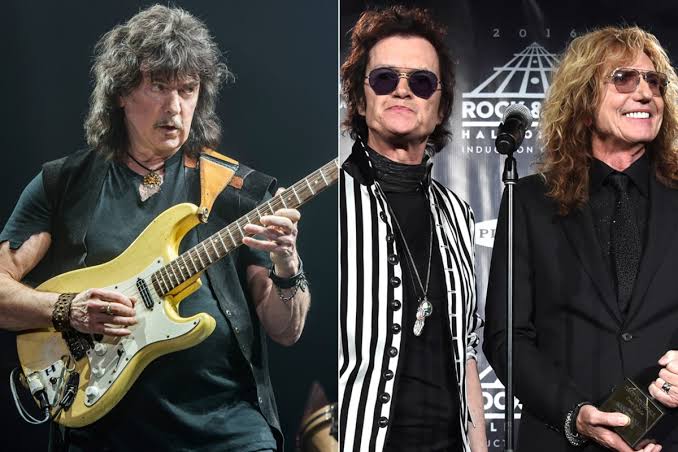Breaking News: Ritchie Blackmore ian paice Jon lord David Coverdale Glenn hughes Rock Legends Reunite in Spirit – A Tribute to Deep Purple’s Greatest Lineup🎸❤️🔥…..
In a powerful moment of nostalgia and musical reverence, fans of classic rock across the globe are celebrating a touching and symbolic reunion — not on stage, but through legacy, spirit, and enduring influence. The names Ritchie Blackmore, Ian Paice, Jon Lord, David Coverdale, and Glenn Hughes have once again surged into headlines, reminding the world of a golden era of hard rock that changed music history forever.
While not all of these legends are still with us — the late Jon Lord passed in 2012 — the mention of these five iconic musicians evokes the electric energy and pioneering sound that defined Deep Purple’s legendary “Mark III” lineup. This formation, which brought together technical virtuosity, soul-infused vocals, and blistering guitar riffs, continues to captivate old fans and attract new generations of rock enthusiasts.
A Legacy Forged in Fire and Sound
Ritchie Blackmore, the enigmatic and brilliant guitarist, is often hailed as one of the founding fathers of heavy metal and hard rock guitar playing. His unforgettable riffs on tracks like “Burn” and “Mistreated” defined an era. Blackmore’s fiery precision and classical influences set a new standard for rock guitarists, and his role in shaping Deep Purple’s evolution cannot be overstated.
Behind the drums, Ian Paice — the only constant member of Deep Purple throughout their decades-long career — delivered thunderous rhythms and complex patterns with apparent ease. Paice’s drumming was the backbone of the band’s dynamic sound, combining swing, jazz influences, and sheer power into one unshakable force.
Keyboard maestro Jon Lord added another dimension entirely to Deep Purple’s sound. Fusing classical sensibilities with raw rock energy, Lord’s Hammond organ solos and sonic textures were groundbreaking. His role as both a composer and performer made him one of the most respected keyboardists in rock history.
Joining the group in the mid-70s, vocalist David Coverdale brought a bluesier, more soulful edge to Deep Purple, eventually founding the successful band Whitesnake. His deep, rich vocals and charismatic stage presence elevated the band’s emotional power and broadened their appeal.
Glenn Hughes, whose funk-influenced bass playing and soaring tenor vocals complemented Coverdale perfectly, brought a fresh energy and versatility. Hughes would go on to have a successful solo career and collaborations with acts like Black Sabbath, further showcasing his immense talent.
A Timeless Reunion of Influence
The renewed buzz around this lineup isn’t just about a look back; it’s a celebration of their continuing influence. Whether it’s Ritchie Blackmore’s recent activity with his band Blackmore’s Night, Glenn Hughes touring with The Dead Daisies, or David Coverdale’s retirement tour drawing massive crowds, the spirit of Deep Purple’s most dynamic lineup lives on.
Social media has exploded with tributes, video clips, and rare photos, uniting fans across decades. Hashtags like #DeepPurpleMarkIII, #RitchieBlackmore, and #JonLordForever are trending globally, underscoring how deeply this group still resonates with audiences today.
More Than Music: A Cultural Touchstone
Deep Purple’s impact isn’t just musical — it’s cultural. Their fearless fusion of genres, constant reinvention, and commitment to artistic integrity paved the way for countless bands. The legacy of Blackmore, Paice, Lord, Coverdale, and Hughes continues to shape rock music’s identity, from the mainstream to the underground.
Whether you’re a lifelong fan or discovering their brilliance for the first time, one thing is clear: the mention of these five names together isn’t just a nostalgic flashback — it’s a reawakening. These men didn’t just make music; they crafted a movement, and that movement still echoes in the halls of rock history.
As the world revisits the power and passion of Deep Purple’s most beloved era, one truth remains: legends never fade — they burn on.
